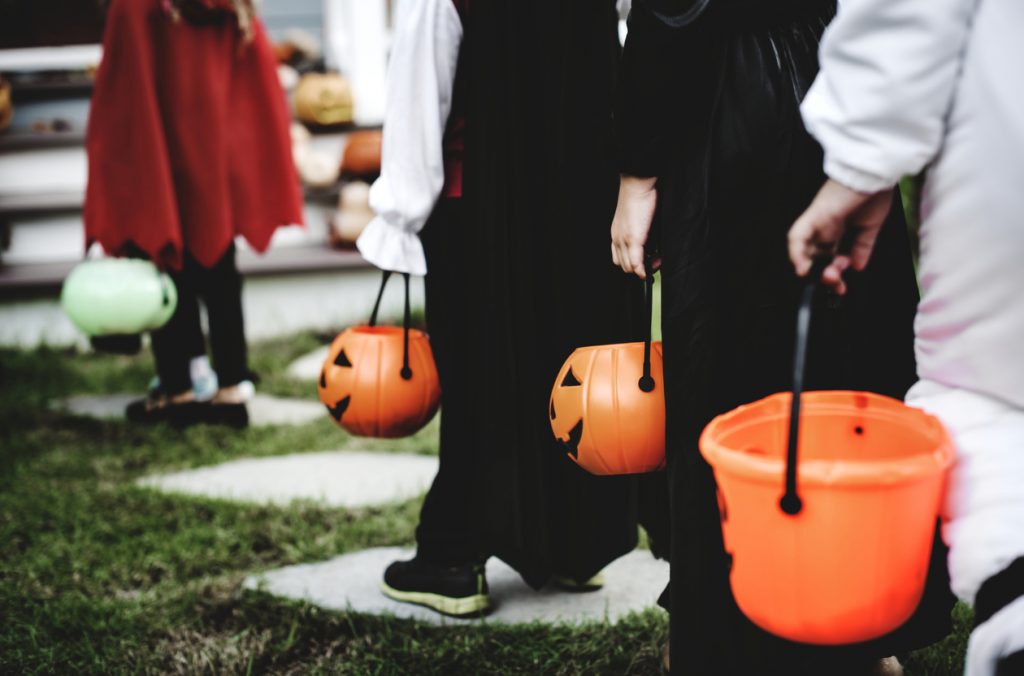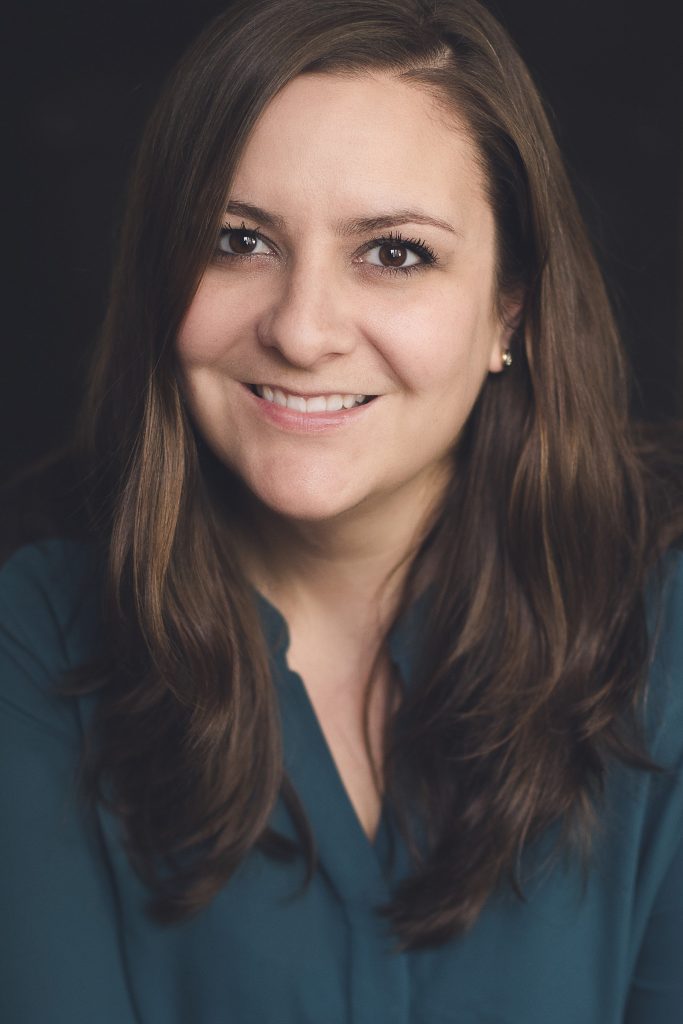Another Person’s Culture Is Not Your Halloween Costume

October is here, and that means several things: school is back, summer clothes can finally be packed away for the year, and it’s time to get creepy with your Halloween decor and costume planning. Halloween is the best. And honestly – I can’t wait to cover our yard in skeletons and steal my kids’ miniature chocolate bars for weeks on end.
It’s going to be great.
But here’s the thing. Can we collectively agree to NOT engage in Halloween cultural appropriation this year? Because it’s high time we knew better but clearly, as a society, we do not. (Just watch the news.)
What exactly is Halloween cultural appropriation?
It’s not just overt racism that’s a problem (though to be clear, that’s a HUGE problem). Each and every year, I see them: costumes that stereotype, mock and even sexualize non-white cultures. I’m talking about geishas, sugar skull makeup, ‘Indian Princesses’ (the language alone being problematic) and other trivialized representations of people of colour. Sometimes, the costume represents a specific person or character (Pocahontas, for example) and other times, it’s something vague, like “Mexican Man” (a real costume sold in stores). Don’t even get me started on costumes that involve blackface, which I cannot believe we are still debating in this day and age.
Let’s address one thing immediately because it’s important: I am not a person of colour. I’m white and so are my kids. I’ve never experienced racism or had it directed at my family, and I’m absolutely not the most important voice in this conversation. Not even close. That said, I’m not comfortable staying quiet or apathetic about an issue that hurts marginalized communities. Apathy can be just as loud as hatred, and that’s not how I want to raise my children. It’s not enough to ‘not be racist’ – that’s the bare minimum of standards, honestly – it’s about being conscious of how our actions affect others, particularly if you’re a privileged person such as myself.
So, back to costumes.
There are literally ENDLESS possibilities for what children (and adults) can be for Halloween. A shark, a wizard, an evil clown, a crime-fighting cartoon puppy, a banana, a giant hot dog, a creeper from Minecraft, a velociraptor, whatever. Follow your dreams and get weird, kids. When I was six, I dressed up as a flower pot and it was awesome. For years, I went with different characters from The Wizard of Oz – Dorothy, the witches, even one of the lollipop kids. There are no limits.
…except there are if you really care. And there should be.
Another person’s culture is not your costume. Halloween cultural appropriation is not okay, even when your intentions are good. People of colour do not exist for the amusement of white people, and that includes dressing up in a way that mocks or hurts marginalized communities – even inadvertently.
When you “celebrate” your love for a character or culture by dressing up as a caricature of it, you’re not honouring anyone – you’re hurting them. This is true whether you want it to be or not, and even if someone in that ethnic group told you it was okay. That person may have been avoiding conflict or trying not to hurt YOUR feelings, and even if they truly don’t care, they certainly don’t speak for an entire community that does – so stop. And please, for the love of all things holy, don’t be a “sexy” version of any culture. That’s beyond awful, and there’s no fathomable reason for it. Be a flower pot instead.
Let’s use Indigenous culture as an example of Halloween costumes gone wrong. It’s very common to see “Indian Princess” and “Indian Warrior” costumes for sale in popular costume stores. I use quotation marks here because that’s not my language – it’s the way these costumes are labelled, often with a sexualized twist. But let’s look at the reality: Indigenous people have been horribly mistreated and discriminated against for hundreds of years. Sometimes, they are completely ignored. There are First Nations communities in Canada RIGHT NOW that don’t have clean drinking water. Some haven’t had it for decades. There is a full-on epidemic of missing and murdered Indigenous women (MMIW) in this country, and the last residential school was in operation until 1996. This is but a FRACTION of the list I could make, but you get the point.
Indigenous people have been abused by this country. Think about that – really, truly sit with that information and imagine yourself in that life – and then try to tell me that it’s okay for a non-Indigenous person to wear some knock-off version of a sacred ceremonial headdress, just for fun. It’s not okay. It’s not just headdresses or sexed-up ‘Native Girl’ costumes or the problematic representation of Pocahontas – it’s all of it. In no way, shape or form should a non-Indigenous person dress in costume as an Indigenous person. The same goes for other cultural appropriations. We need to accept this, and we need to teach our kids not only what is hurtful, but WHY. This is how we do better.
Granted, the person wearing the costume often doesn’t mean to offend – and that’s a good start. It means there’s room for compassion and an informed desire to change. When I see a person trick-or-treating in a feather headdress, I cringe hard and feel sad – but I don’t necessarily think the wearer is a bad person. I think they’re unaware of the impact their actions may have, and I’m hopeful they will learn and grow. That headdress may be beautiful, but it’s not yours to play with.
A simple way to tell if a costume is problematic is to ask the following questions:
- Does this costume marginalize or sexualize a culture other than my own?
- Is it attempting to honour a person or culture by wearing items that are unique to that culture, even though I/my child won’t face the same discrimination this person/culture faces?
- Have I/my child altered my skin tone for this costume?
If you even HESITATE when answering one of these questions, it’s time for a new costume idea.
There may be areas of genuine confusion (should my white daughter dress up as Princess Jasmine? What about Moana?) and honestly, there are some grey areas for Halloween cultural appropriation here. The character of Jasmine was from a fictional country but used many harmful stereotypes of Arabic cultures, which is why it’s often considered offensive. The team behind Moana, however, was praised for working with cultural advisors to avoid this same fate and was applauded for doing a pretty great job (there have been minor criticisms, but largely, the film is viewed as being celebratory and respectful of Polynesian culture).
Knowing this, a Moana costume (clothes only, without any altering of skin tone) may seem harmless to a lot of people – including those of Polynesian descent. But others of Polynesian descent have expressed displeasure in seeing their culture in costume form, much in the same way an Indigenous headdress is sacred. Maui costumes were actually pulled off the shelves with apologies, as they involved brown mesh sleeves that darkened the wearer’s skin tone while depicting cultural tattoos (this is understandably different than simply putting on a Moana skirt or a Princess Tiana dress). But where is the exact line? That can be harder to determine, especially if you’re not a part of the culture being depicted. My opinion, personally, is when in doubt, move on.
It’s better to play it safe than it is to cause deep, lasting hurt to another person.
I’m not trying to be the fun police or super politically correct. I don’t want to ruin your Halloween. I just want people to acknowledge and consider the harm that befalls people of colour when they are treated like a dress-up game. It’s a terrible cycle of behaviour that has no place in my house or modern society. Let’s end racism, already, or at least stop being so damn complacent about it. We’ve made a little progress on addressing sexism, sort of, and that helped (because what is hand in hand with Halloween cultural appropriation is Sexist Halloween! But that’s another post.)
Halloween should and can be fun for EVERYONE – not just the most privileged among us. Let’s be awesome parents that teach our children love and respect, uplifting others instead of pushing them further down. Kindness is a look you’ll never regret.
There are many excellent articles that dive deep into the impact of cultural appropriation, many of which were written by individuals who have experienced racism in their own lives. I encourage you to seek out and read these articles, as their words need to be heard far more than mine do.
















Erin Pepler,
By suggesting that people dress up as Lollipop kids, you are being hypocritical. Little peope who played the parts of the Lollipop kids were abused on set and suffer from being stereotyped in urban legends which claim suicide on set and many other lies and atrocities. They were underpaid, put on display as lesser and generally mistreated. Do you think it’s funny to dress up as a little person when as you say about other costumes, you will never suffer what they were subjected to? See how that works? You didn’t mean to insult and degrade little people did you? But you went there and you didn’t even know it. Ironic, right? And I hope this helps you be kinder in your future articles, more thoughtful and less reactive before hitting the publish button. Of course some costumes are wrong and racist and people should know better but not everything on this earth is a conspiracy and education is key to eliminating hurt. You made a mistake suggesting dressing up as a little person right? Should your name be hauled through the mud? No. Are you embarrassed that you did the very thing you are judging others for with your admitted heavy cringing? People might cringe at your choices even if you meant no harm and that is not nice to make judgy assumptions as you do about what you call grey areas. A downtrodden girl might choose Jasmine because in the live action version she was a strong, female leader who will not stand for abuse that girls of every colour and nation suffer from.
Have a happy, positive day,
Dianne
Dianne: You’re right, I dressed up as a Lollipop Kid from The Wizard of Oz when I was six years old, in 1991. I didn’t actually suggest that others wear this specific costume today, but I did reference it and in fact wear it myself as a child (it was a white dress with swirly, colourful stripes and a lollipop headpiece, actually – not really what the characters in the film wore, but it was a homemade costume and most people understood the reference of lollipop + me, a kid). Your comment about the treatment of Little People during the filming of that movie could have been interesting food for thought – I hadn’t considered that angle, and would be genuinely interested to know if Little People find a Lollipop Kid-inspired costume offensive because they were part of the ‘munchkin’ characters in the film. If so, it’s a valid point and very true that I didn’t consider it (especially in kindergarten). It’s thought-provoking for me now, as an adult (though honestly, it feels like you’re looking for a reason to attack, given the rest of your comment and your overall tone). We could have had an interesting conversation about it, probably, had you not approached this by repeatedly insulting me and then, in the next breath, suggest I be kinder.
So, am I not allowed to reconsider things like this myself when necessary? Because I wrote an article suggesting that white people don’t wear blackface or dress up as Indigenous people, and that we avoid grey areas that *might* be equally hurtful to other cultures, particularly marginalized communities? The whole point of this piece was opening your mind to other people’s suffering and then actively avoiding actions that contribute to that. This is something I very much try to do as a parent and a human being. I’m not without flaw, obviously, but I genuinely try to be considerate of others. I may punch up sometimes, but never down. I’m all about critical thinking and living with empathy and kindness, and if you feel angry or shamed by what I wrote, that’s your own thing to sort out.
I have a hard time with one side of things and maybe I am being ignorant here. I don’t mean to be, but can understand how someone may think in regards to my comments:
What about when your kid worships an indigenous leader and wants to be like them as you would with superman or a non fictional impressionable character from a book. The school brings in this leader and the kids worship him like no one I have ever seen. If he says it is ok, you say no it isn’t. Not sure who to go by. Some cultures like to be recognized in a tasteful way, rather than continue to be ignored, you are saying no regardless. I am truly confused and do not know what would be the right way even though you say nothing is the safer route. This is a kid’s hero, but you are more worried about the people that can’t see the person the way my son would. It seems backwards in some ways, but I get where you are coming from…see how it can be hard to understand when it comes from a good place? Are we now teaching our white kids racism when they are completely oblivious to it in the first place? Yes, they have more opportunities than minorities with no effort, but can being open to the indigenous heroes open the door for less racism in the future?
Thank you for your article. It is such an important message and collectively, we need to do better. Decolonizing our country will take white settlers to acknowledge the unconscious racism and stereotypes that permeate our society. These harms are real and leave a lasting impact. Costumes are a place to start to have these conversations about issues that people would rather minimize or avoid. Thank you again for the courage to talk about this important topic.
Thank you for your thoughtful response, Candace!
I rarely comment on articles but I found something stated here so offensive that I felt compelled to speak up. The author implies that if someone from another culture says it’s okay for others to dress up like that culture, then that person’s opinion should be discounted because that person is–according to the author–being dishonest to avoid conflict or avoid hurting someone else’s feelings, or that person’s opinion should be discounted because that person doesn’t speak for their culture’s entire community. (I’m not sure what ethnic-specific poll numbers the author is looking at, but that’s a separate matter.) Considering that a community is made up of individual voices, I’m not sure what gives the author the right to say that she knows what other people mean better than they do. It is especially troublesome that the author makes this statement under the guise of acting in those very people’s best interest. I happen to come from a culture that people dress up as. I appreciate it when people dress up as someone from my culture because our traditional dress is beautiful, it sparks the interest of others to know where in the world that dress originated, it may encourage tourism to my home country and, hopefully, an appreciation for our culture and cuisine. I believe imitation can actually be the sincerest form of flattery as long as that imitation is done tastefully. I hope kids in particular continue to dress up as their heroes, especially if those heroes hail from a different country. The author is free to disagree. What the author is not free to do is to encourage the dismissal of other people’s opinions as to their own culture when those opinions don’t align with the author’s theory on what is best for that culture. It is hypocritical for the author to purport to act in any culture’s best interest while also claiming that the people in that culture think what she says they think, not what they say they think. Thank you.
Hi Allie – wanted to clarify something. The point I was making is that sometimes, a large group of people have spoken out about the hurt cultural appropriation causes and then people say things like, “well my friend/co-worker is X race and they said it’s fine.” I don’t think this is enough, generally speaking. No individual person speaks for an entire group of people, but saying, “this one person said it’s okay” doesn’t cancel out a ton of others expressing their hurt. For example, Indigenous communities have spoken out about why non-Indigenous people shouldn’t wear their headdresses, etc. If one person told me they were fine with it, I still wouldn’t do it because I know many others are not fine with it. You can’t please everyone all the time but I’d rather err on the side of caution and respect.
Non white people dress like white people everyday , they adopt our clothing styles. shod we limit Indians to just wearing traditional dress and stop them appropriating our fashion? or is your form of racism just one way?
Pretty sure that the only people we call Indians these days are people actually from India, unless your comment means you think Indian women should only wear sarees and it’s racist if they wear anything else?
@Corrine McDermott I use the term Indigenous throughout this post with the exception of mentioning the name of the costume. Meaning, that’s how it’s labeled in stores and that’s problematic.
@Corrine Sorry, just realized you were directing that at another commenter (hence my attempt to clarify my own language). The layout here is confusing!
no worries 🙂